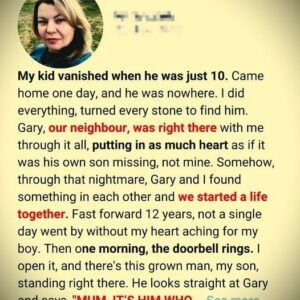A nine-year-old boy lived alone for two years in a cold apartment in southwestern France after his mother abandoned him to live with her boyfriend. The child fended for himself in an apartment in Nersac, France near Angoulême, as his mother moved three miles away. Last week, the 39-year-old mother was sentenced to six months in prison for abandoning and endangering the minor. While the boy’s father, living in another town, faced no charges.
From 2020 to 2022, the
abandoned boy endured periods without hot water, heating, or electricity
He coped by washing in cold water and using sleeping bags and blankets for warmth. To survive, he resorted to stealing tomatoes from a nearby balcony and scavenging for food from neighbors. Concerned neighbors eventually reported the situation to the police, leading to the boy being taken into care.
Despite attending school, the boy’s life of solitude and neglect went unnoticed. Partly because he maintained cleanliness, good grades, and completed homework.
The town’s mayor, Barbara Couturier, explained that the boy seemed to create a protective facade. Giving the appearance that everything was fine. “I think it was also a kind of protection that he put around himself to say ‘everything is fine,” she said.
The neighbors first spotted the issue, suspecting something wasn’t quite right
Neighbors who raised concerns with the boy’s mother were dismissed, as she insisted she was caring for her son and asked them to stay out of her business.
Locals claim the neglect remained undetected due to the boy’s ability to look after himself.
During his two-year solitary struggle, the abandoned boy resorted to taking tomatoes from a nearby balcony and searching for food among neighbors.
Eventually, the concerned neighbors reached out to the police, leading to the boy being placed in care.
A classmate revealed that the boy often ate alone, took the bus alone, and rarely went out, staying home most of the time. The mother’s claim of living with her son was disproven during the trial using mobile data showing her limited presence at the flat. “He told his mates that he ate his meals alone and took the bus alone. He didn’t go out and stayed home all the time.” Said the classmate.
Turning guilt into relief
Neighbors expressed guilt for not realizing the situation sooner. Attributing the anonymity of modern life as a factor enabling the neglect to persist. “When there was a family and a village around the family, if the mother neglected the child, it didn’t matter too much, because the rest of the family and the whole village took care of the child. It’s not like that anymore,” a local resident said.
What does the University of Nottingham say about abandonment?
In a survey of 10 EU countries (Bulgaria, Czech Republic, Denmark, France, Hungary, Lithuania, Poland, Romania, Slovakia, and the UK), there is a notable absence of a clear legal definition for child abandonment. This lack of clarity and the ambiguity surrounding what qualifies as child abandonment pose challenges for both research and practical efforts related to this issue.
Child abandonment is a significant factor leading to institutional care for children under three. A comparison of institutions in Western Europe revealed that only 4% of children were abandoned. Whereas in Central and Eastern Europe, the figure was much higher at 32%. Romania, Hungary, and Latvia had the highest rates of abandoned children in institutional care. While Denmark, Norway, and the UK reported child abandonment as rare.
EU countries are implementing various measures to prevent child abandonment. These initiatives include:
Social assistance
Day-care facilities
Mother-baby units
Family planning services
Counselling services for mothers and/or families
Financial support
Programs targeting high-risk families and child identity
Parent training centers’
Helplines offering support for mothers in need Guidance on preventing child abandonment at maternity units
The presence of social workers in maternity units
• Training for hospital staff to recognize and handle high-risk situations, providing positive counseling.





